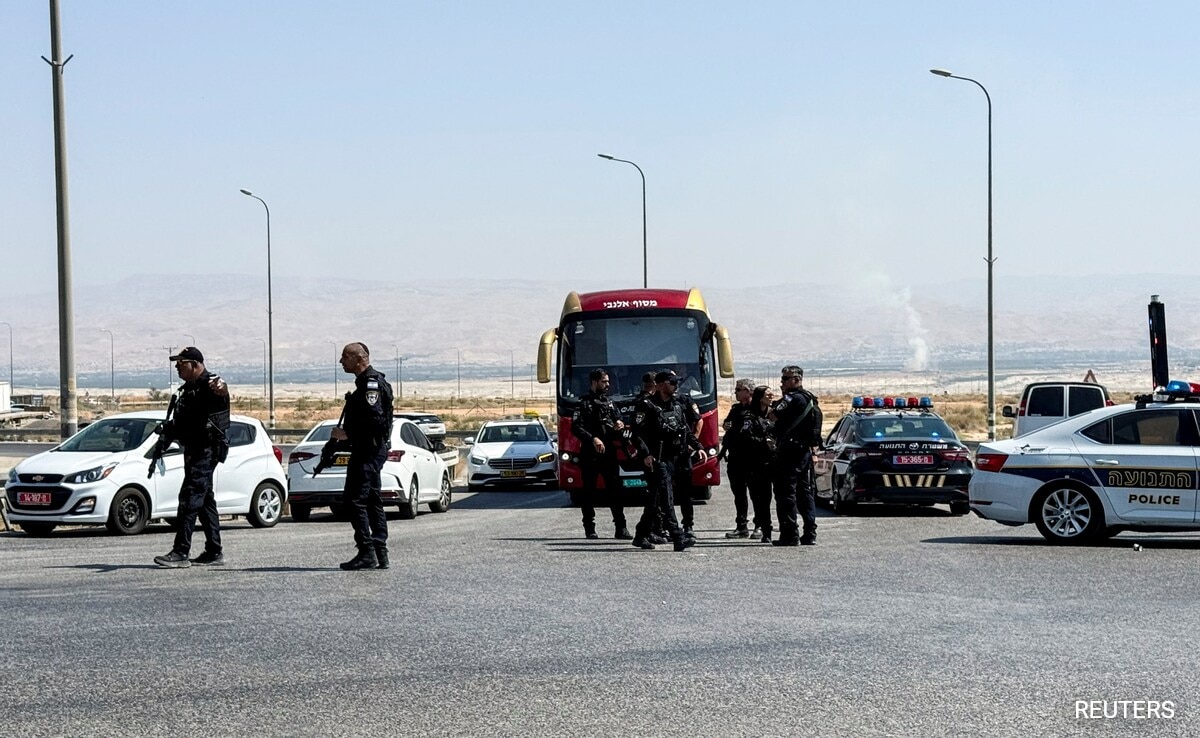A truck driver shot dead three Israeli guards at a border crossing between the occupied West Bank and Jordan Sunday before being “eliminated”, Israel’s military said, as it pounded Gaza with new strikes.
Jordan’s interior ministry identified the shooter as Jordanian national Maher Diab Hussein al-Jazi, citing “preliminary investigations”.
The rare attack at the Allenby Bridge crossing comes amid soaring violence in the West Bank with major Israeli raids and attacks by Palestinians, and against the backdrop of the Israel-Hamas Gaza war, now in its 12th month.
The military said “a terrorist” reached the crossing area, also known as the King Hussein Bridge, in a truck “from Jordan”.
The driver “exited the truck and opened fire at Israeli security forces operating at the bridge”, a military statement said.
“Three Israeli civilians were pronounced dead as a result of the attack,” it said, clarifying to AFP that they were “security guards” and not in the army or police.
The attacker was shot dead, the military added.
Prime Minister Benjamin Netanyahu denounced the assailant as a “despicable terrorist” inspired by “a murderous ideology” which he said was fuelled by Iran.
Hamas praised the attack but did not claim responsibility for it, adding it “affirms the Arab peoples’ rejection of the (Israeli) occupation, its crimes, and its ambitions in Palestine and Jordan”.
The crossing, in the Jordan Valley, is the only international gateway for Palestinians from the West Bank that does not require entering Israel, which has occupied the territory since 1967.
Bloodshed rises in West Bank
Violence in the West Bank has surged alongside the war in Gaza which began after Hamas attacked Israel on October 7.
Israel’s military on August 28 launched simultaneous raids across several cities and refugee camps in the northern West Bank, killing at least 36 Palestinians, according to the Ramallah-based Palestinian health ministry.
The military said it killed 35 operatives. Hamas and Palestinian Islamic Jihad claimed at least 14 of the fatalities as members.
Since October 7, Israeli troops or settlers have killed at least 662 Palestinians in the West Bank, according to the Palestinian health ministry.
At least 23 Israelis, including members of the security forces, have been killed in Palestinian attacks during the same period, Israeli officials say.
The Hamas attack on Israel resulted in the deaths of 1,205 people, mostly civilians including some hostages killed in captivity, official Israeli figures show.
Operatives seized 251 hostages during the attack, 97 of whom are still held in Gaza, including 33 the Israeli military says are dead.
Israel’s retaliatory offensive in Gaza has so far killed at least 40,972 people, according to the health ministry in the Hamas-run territory.
The UN human rights office says most of the dead are women and children.
On Sunday, Israel pounded Gaza with air strikes and shelling as prospects remained dim for a ceasefire.
Gaza’s civil defence agency said nearly a dozen people were killed in Israeli air strikes on Sunday, including five in Jabalia refugee camp.
The Israeli military said it had struck around “25 Hamas targets” across Gaza over the past day.
No respite for Gazans
There has been no respite for the 2.4 million Palestinians living in Gaza, almost all of whom have been displaced at least once.
“Moving from one area to another is distressing because there is no safe place in Gaza,” said Raeed Hamad, 51, a cancer patient from the southern city of Khan Yunis.
“We are displaced under heavy bombardments… I have lost weight and I’m exhausted.”
Defence Minister Yoav Gallant toured the Netzarim Corridor in central Gaza on Sunday, where he vowed again to eliminate Hamas.
But he said the military was focusing on the northern front also, where Lebanese group Hezbollah and Israeli forces traded fire on Sunday.
“While you are fighting here in Gaza, we are preparing for anything that may happen in the north,” Gallant told soldiers, according to a statement issued by his office.
“The shift of the centre of gravity can happen quickly and can also involve you in a short period of time.”
Hamas is demanding a complete Israeli withdrawal from Gaza as part of a ceasefire deal, but Israel insists troops must remain along the Gaza-Egypt border.
The United States, Qatar and Egypt have all been mediating in efforts to forge a ceasefire.
Israeli protesters numbering in the tens of thousands have mounted pressure on the government, demanding a deal that would mean the release of hostages.
Late Saturday, mass protests were again held in Tel Aviv and some other cities. Organisers said more than 500,000 people took part.
“We must demand that no one forgets the hostages, no one ignores them, no one leaves them to die,” said Andrey Kozlov, one of the scores of hostages freed during the one-week truce in November.
“Their time is running out. We see it, we feel it. Bring them back home now.”
A smaller crowd of several hundred people gathered in Tel Aviv on Sunday night holding Israeli flags and signs demanding the government “stop the war” and free the hostages.
“We will not leave them in Gaza,” they chanted, some pounding on drums. “We will not leave them down there… We don’t want more deaths, it’s time for agreements.”
International pressure to end the war has also intensified after Friday’s fatal shooting in the West Bank of Turkish-American activist Aysenur Ezgi Eygi, who was demonstrating against Israeli settlements in the territory.
Her family, Turkey and the UN rights office all said Israeli forces killed her. Israel’s military said the incident is under review.












